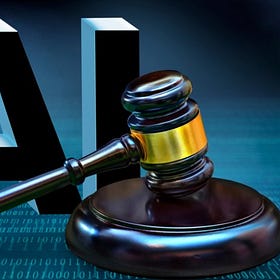How AI Can Help You Market More Ethically in 2025 + Top 10 Posts for 2024
In 2025, create marketing campaigns using artificial intelligence without losing your customers' trust
This is the last issue of the AI Marketing Ethics Digest for 2024. We’re spending the holidays with family and friends, and we hope you do the same.
Artificial intelligence (AI) is a powerful marketing tool. It can help you create more personalized, relevant, and effective campaigns by analyzing customer data, generating content, optimizing channels, and measuring performance.
But (and it’s a big but) AI also comes with ethical challenges, such as privacy, bias, accountability, and trust.
In 2025, how can you use AI in your marketing campaigns without compromising your values? Transparency and trust are the keywords — the currencies on which modern marketing trades.
Learn why transparency is vital in AI-assisted marketing and how to deal with the potential issues that may come up.
Transparency and trust are the currencies on which modern marketing trades.
Benefits of AI-assisted Marketing
AI can make your marketing campaigns better in many ways, such as:
Enhanced customer experience. AI can help you understand what your customers want, need, and think and deliver personalized and timely messages, offers, and recommendations.
Improved efficiency and productivity. AI can automate and simplify many marketing tasks, such as creating content, segmenting customers, targeting ads, and testing strategies, saving time and money.
Better decision-making and performance. AI can give you insights and analytics to help you improve your marketing strategies, channels, and budgets and measure your campaigns' impact and ROI.
Risks of AI-Assisted Marketing
AI can also create some problems for your marketing campaigns, such as:
Privacy and data protection. AI depends on a lot of customer data, which may raise questions about how the data is collected, stored, used, and shared and whether it follows the relevant laws and regulations, such as GDPR.
Bias and discrimination. AI may show or increase the biases and prejudices of the data, algorithms, or human developers, leading to unfair or wrong outcomes, such as excluding or targeting specific customers based on their demographics or characteristics.
Accountability and liability. AI may make decisions or take unclear or unintuitive actions, raising questions about who is in charge or responsible for the results. This includes customer complaints, legal issues, or reputational damage.
Trust and credibility. AI may affect how your customers trust your brand, especially if they are unaware of your use of AI or if the AI-generated content is misleading, wrong, or inappropriate.
How to Achieve Transparency in AI-assisted Marketing
To avoid ethical issues and ensure transparency in AI-assisted marketing, you should follow some best practices, including:
Inform and educate your customers. Explain how and why you use AI in your marketing campaigns, and teach them about the benefits and risks and their rights and choices, such as opting out or requesting access to their data.
Ensure data quality and security. Ensure that the data you use for AI is accurate, relevant, and representative. Collect, store, use, and share data safely and compliantly, respecting your customers' privacy and consent.
Avoid and mitigate bias and discrimination. Test your AI systems for any possible bias or prejudice. Take steps to fix or prevent them, such as using diverse and inclusive data sets, algorithms, and teams and applying fairness and equality principles.
Provide accountability and explainability. You should be able to justify and explain the decisions and actions of your AI systems. You should also provide ways for feedback, review, and redress, such as audits, reports, or complaints procedures. Finally, you should assign clear roles and responsibilities for supervising and managing AI.
Build trust and credibility. Be honest and transparent about how you use AI in your marketing campaigns and its limitations. Ensure that AI-generated content or recommendations are relevant, accurate, and appropriate and match your brand values and customer expectations.
Make 2025 the year AI marketing ethics becomes a core component of your marketing plans and campaigns. We can help in two ways:
AI Marketing Ethics Training - a half-day workshop for marketing teams.
AI Marketing Ethics Resources - includes links to AI ethics policies, guides, articles, and more.
Check them out!
Top 10 AI Marketing Ethics Issues for 2024
Unmasking AI in Advertising: Why Transparency Is Key to Consumer Trust
First, let me say “Happy Thanksgiving” to those celebrating the day. Here’s a link to its historical perspectives from the National Archives.
How AI Ethics Will Define Your Brand's Future
I had the privilege of being interviewed by Pallavi Sharma, founder and CMO of witOmni AI Marketing, for her podcast, AI Inclusive.
How Mondelez Humanizes AI with Empathy
As a global leader in the snack and confectionery industry, Mondelez, maker of brands like Oreo, Cadbury, and Ritz, understands the importance of connecting with customers personally.
California's AI Laws and Their Impact on Marketing Ethics
California's recent passage of several AI regulatory bills has sparked a nationwide conversation about the future of AI governance. These laws, including the Safe and Secure Innovation for Frontier Artificial Intelligence Models Act and the California AI Transparency Act, set new standards for AI safety, transparency, and accountability. As other states…
Navigating the Threat of AI in Marketing, Journalism, and Creative Works
Artificial intelligence is transforming marketing, journalism, and creative industries, opening opportunities and raising ethical concerns. Businesses can quickly and affordably create content with AI, but they need to address the new challenges that this efficiency brings responsibly.
AI-Powered Visitor Identification: Ethical Loophole or Landmine?
As traditional cookie-based tracking faces rising scrutiny and legal regulations, marketing teams are challenged to understand website visitor behavior and target leads without violating privacy laws. AI-powered visitor identification software presents a powerful alternative, surmounting barriers to gathering information by extracting surprisingly accur…
AI, Ethics, and the Future of Work
Thank you for being a member of the AI Marketing Ethics Digest community. As a premium subscriber, you’ve helped make AI Marketing Ethics Digest what it is today.
Can AI Marketing Content Be Authentic?
TL;DR This issue features a guest post from John Munsell, CEO of Bizzuka, an AI marketing strategy consultancy. His post focuses on using AI to enhance your marketing efficiency and effectiveness without sacrificing your brand's authenticity or your creativity. It highlights the significance of strategic, ethical AI use i…
An Ethical Perspective on AI and the Evolving Role of Marketers
TL; DR The ethical costs of AI in marketing include job displacement, devaluation of human creativity, content homogenization, and privacy and data ethics. Addressing these costs will require a focus on upskilling the workforce, ensuring that AI continues to be accessible to all, and creating inclusive solutions that level th…
The Ethics of AI in Marketing: A Conversation with Lately.ai CEO Kate Bradley Chernis
I know I should probably talk about Sam Altman’s ouster as OpenAI CEO and the subsequent maelstrom that erupted — but everyone’s doing that. I’ll deal with it in next week’s issue from an AI marketing ethics perspective. You won’t want to miss it!
















AI in marketing is like a high-powered engine.
It can accelerate your success, but if you don’t have control over the wheel, it might just drive you into a ditch. The key here is transparency, not just to ensure compliance, but to cultivate trust. In 2025, honesty will still be your best algorithm.
Happy New Year Paul